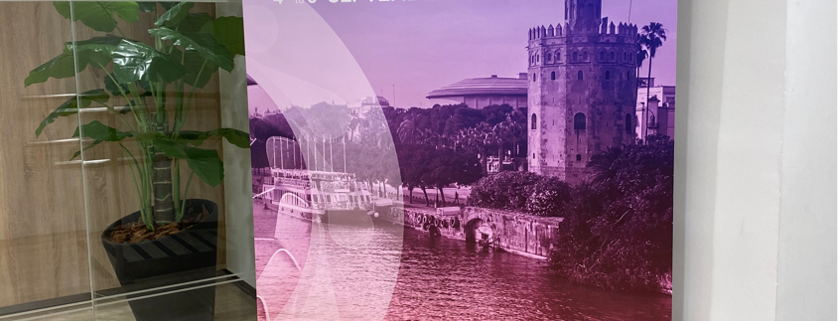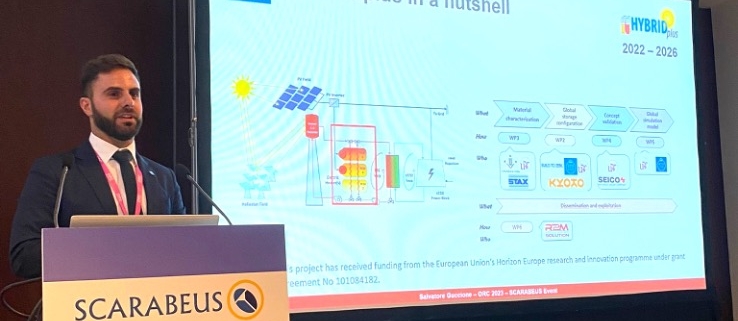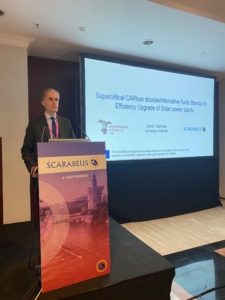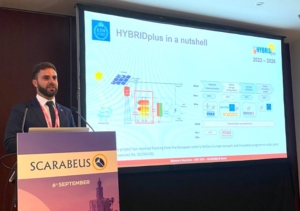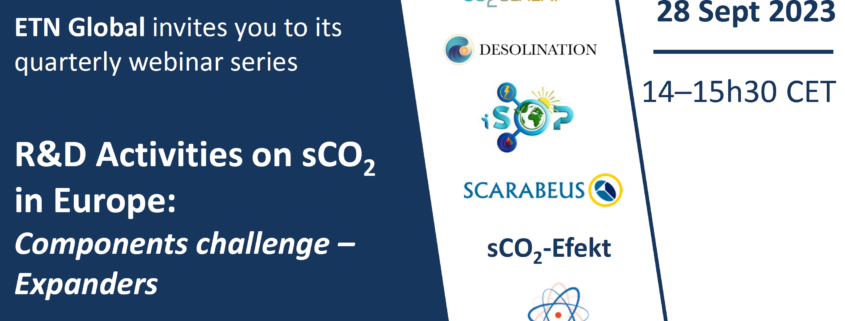SCARABEUS represented at the 7th International Seminar on Organic Rankine Cycle Power Systems
The SCARABEUS project was well represented by researchers from University of Seville at the 7th International Seminar on Organic Rankine Cycle (ORC) Power Systems, held in Seville between September 4th and 6th.
Two papers were presented at the conference, dealing with different aspects of supercritical cycles working on Carbon Dioxide mixtures in Concentrated Solar Power applications:
- Rodríguez de Arriba et al, Mapping the techno-economic potential of next-generation CSP plants running on transcritical CO2-based power cycles
Abstract
Although the thermodynamic potential of transcritical/supercritical CO2-based power cycles for next generation Concentrated Solar Power plants has been already confirmed in literature, further investigation to assess the actual feasibility of this technology from a techno-economic standpoint is needed. In fact, large uncertainty is found when it comes to the estimation of the CAPEX and OPEX of the power block, and the same can be said for the solar subsystem when high Turbine Inlet Temperatures are considered (>700 ºC).
Bearing this in mind, this paper presents a methodology to map the techno-economic potential of next-generation Concentrated Solar Power plants running on CO2-based mixtures, with the final aim to identify the threshold (breakeven) costs of the main subsystems enabling a clear gain in terms of Levelised Cost of Electricity with respect to state-of-the-art steam-based CSP.
Two different systems are studied which differ in the composition and peak temperature of the Heat Transfer Medium: a SoA molten salts system operating at a TIT of 550 ºC (Gen I) and a solid particle system with TIT=700 ºC (Gen II). An integrated platform able to simulate all CSP plant subsystems and perform hourly calculations is built in Matlab employing Artificial Neural Networks to simulate the solar field, ensuring extremely high computational speed.
To overcome the high uncertainty in terms of cost estimation, a two-step analysis is developed: firstly, the CAPEX of the entire plant is calculated assuming correlations from literature, except for the power block, whose estimate brings about the largest uncertainty. As a result, the minimum power block cost allowing a LCoE lower than a certain target is identified. Secondly, an inverse methodology is applied, setting the power block cost and assessing the minimum CAPEX of the solar subsystem. As a result, a map is obtained showing the target CAPEX to be accomplished by sCO2+CSP if a clear reduction of the LCoE of this technology is to be achieved
- Crespi et al., Operational optimisation of the main heat rejection unit of CSP plants based on carbon dioxide mixtures
Abstract
This research, developed in the framework of the SCARABEUS project, studies the off-design performance of transcritical power cycles running on CO2-SO2 mixtures in Concentrated Solar Power applications. The objective of this work is to identify optimum operational strategies that maximise net energy production when exposed to variable ambient temperature, with special focus on the operation of the Heat Rejection Unit (Air-Cooled Condenser). The power cycle is simulated in Thermoflex, modified with user-defined scripts to account for the specific off-design performance characteristics of key components. The Air-Cooled Condenser is modelled by means of an in-house Matlab tool, already validated in previous publications, able to accurately simulate the heat transfer process between working fluid and cooling medium (air) and to calculate auxiliary power consumption.
Four different strategies are identified, depending on ambient temperature: variable or constant condensation pressure for ambient temperatures lower than the design value, and constant turbine inlet temperature or constant return temperature of the heat transfer fluid for ambient temperature higher than design value. The results show that a combination of variable and constant minimum cycle pressure is the best alternative for low ambient temperatures, enabling net system efficiencies higher than 41%. On the other hand, constant turbine inlet temperature enables higher net performance than constant return temperature of the heat transfer fluid, even if at the expense of a reduction in energy storage capacity for the same inventory of molten salts
The papers will be published in the Conference Proceedings and they will be available for download free of charge. Congratulations SCARABEUS team at University of Seville on this excellent dissemination action!

